Ethical Considerations for Healthcare Organizations: A Report
VerifiedAdded on 2023/01/13
|10
|2626
|52
Report
AI Summary
This report analyzes the ethical failures of the Stafford Hospital case, where poor care led to significant patient deaths. The study examines the impact of unethical behavior, including lack of staff, inadequate training, and non-compliance with ethical standards, on patient care, public confidence, and medical staff. It explores how unethical practices affect the NHS and organizational operations. The report concludes that organizations engaging in unethical behavior should not be allowed to continue operating and recommends measures such as maintaining patient confidentiality, adhering to ethical regulations, hiring skilled staff, and fostering a safe environment. The report emphasizes the importance of ethical training, proper monitoring, and compassionate patient care to ensure ethical healthcare practices. The report also suggests that the management and external board of the Stafford Hospital must in turn focus on effectively implying the various ethical regulations and standard of care in order to provide various range of the ethical services in health care sector.
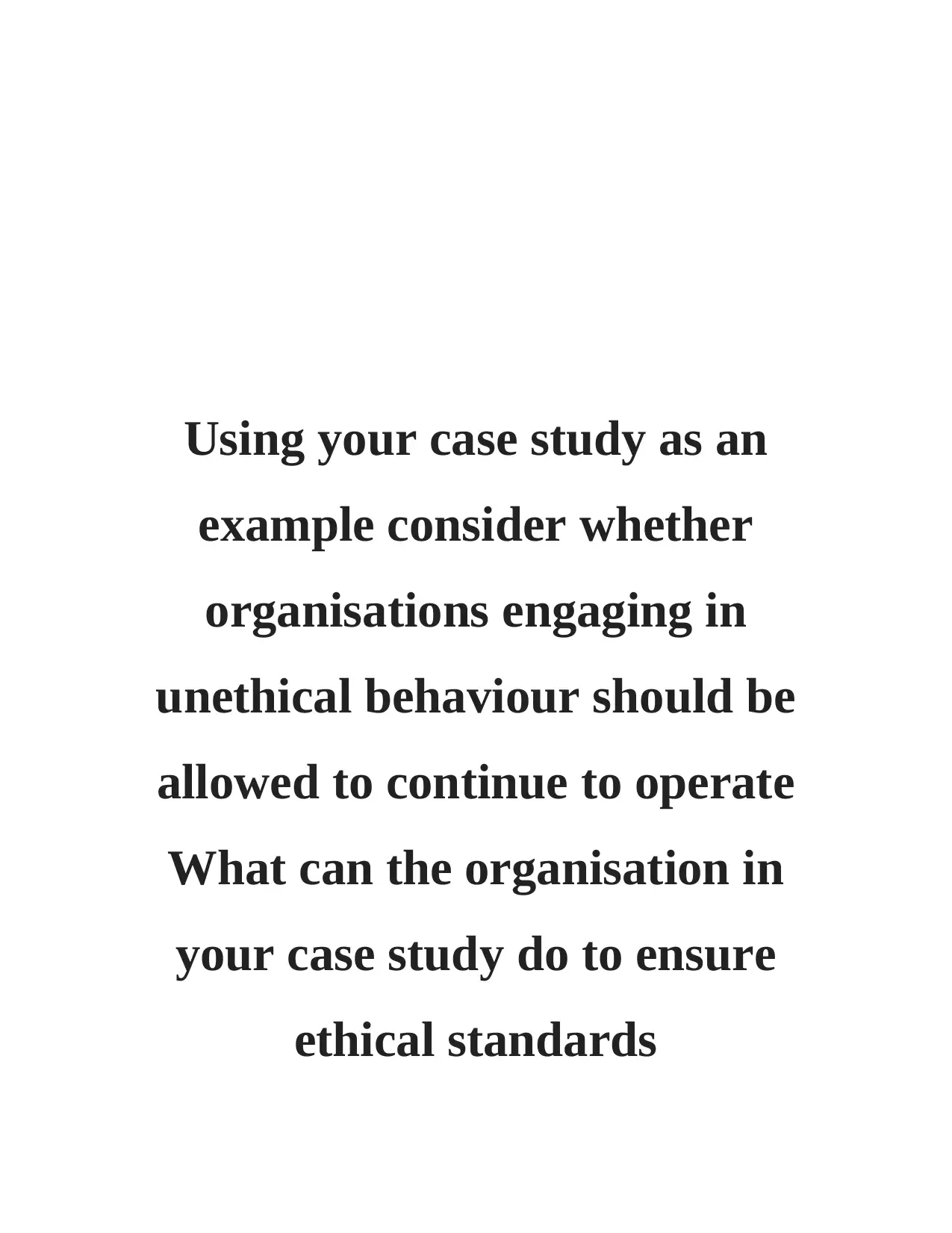
Using your case study as an
example consider whether
organisations engaging in
unethical behaviour should be
allowed to continue to operate
What can the organisation in
your case study do to ensure
ethical standards
example consider whether
organisations engaging in
unethical behaviour should be
allowed to continue to operate
What can the organisation in
your case study do to ensure
ethical standards
Paraphrase This Document
Need a fresh take? Get an instant paraphrase of this document with our AI Paraphraser
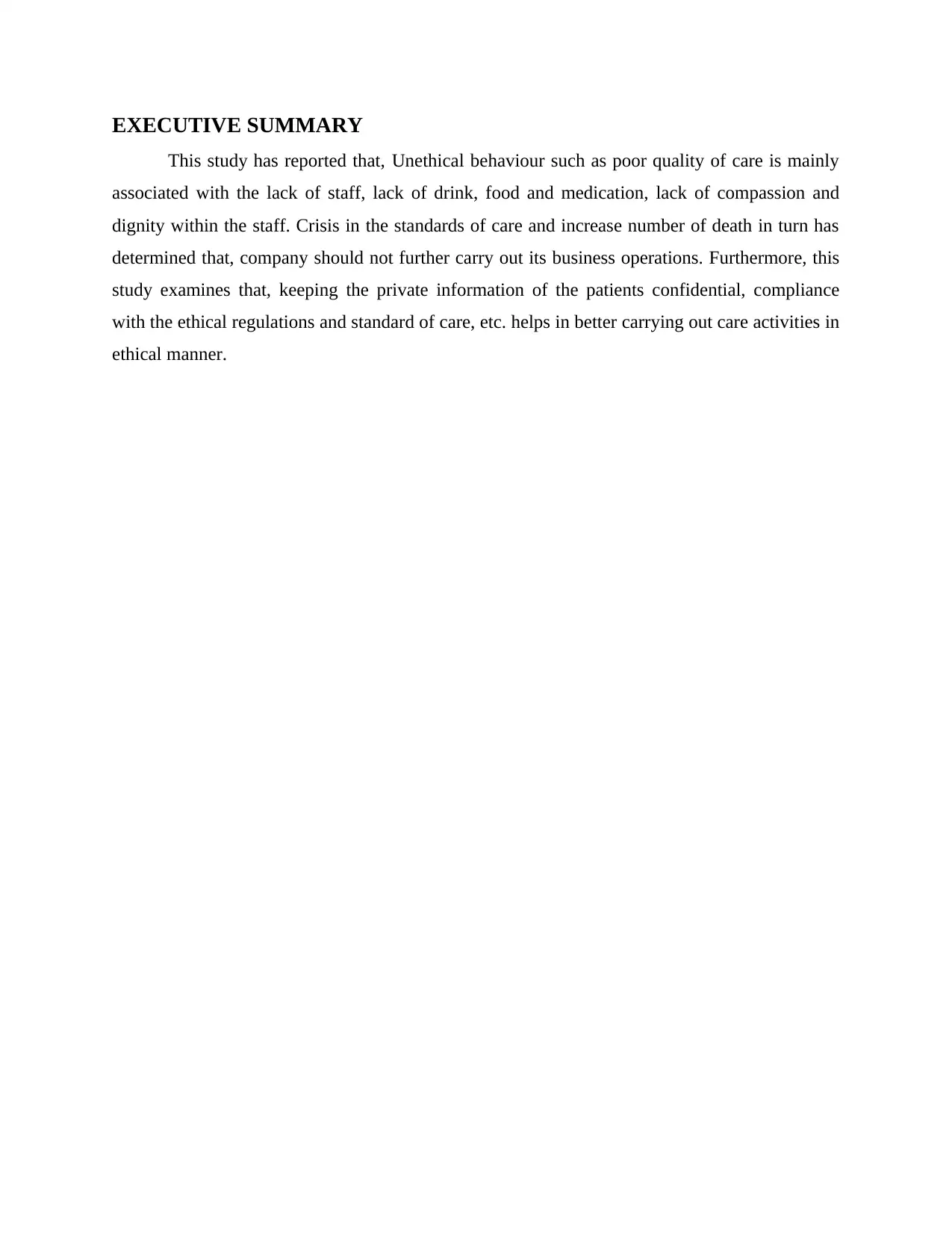
EXECUTIVE SUMMARY
This study has reported that, Unethical behaviour such as poor quality of care is mainly
associated with the lack of staff, lack of drink, food and medication, lack of compassion and
dignity within the staff. Crisis in the standards of care and increase number of death in turn has
determined that, company should not further carry out its business operations. Furthermore, this
study examines that, keeping the private information of the patients confidential, compliance
with the ethical regulations and standard of care, etc. helps in better carrying out care activities in
ethical manner.
This study has reported that, Unethical behaviour such as poor quality of care is mainly
associated with the lack of staff, lack of drink, food and medication, lack of compassion and
dignity within the staff. Crisis in the standards of care and increase number of death in turn has
determined that, company should not further carry out its business operations. Furthermore, this
study examines that, keeping the private information of the patients confidential, compliance
with the ethical regulations and standard of care, etc. helps in better carrying out care activities in
ethical manner.
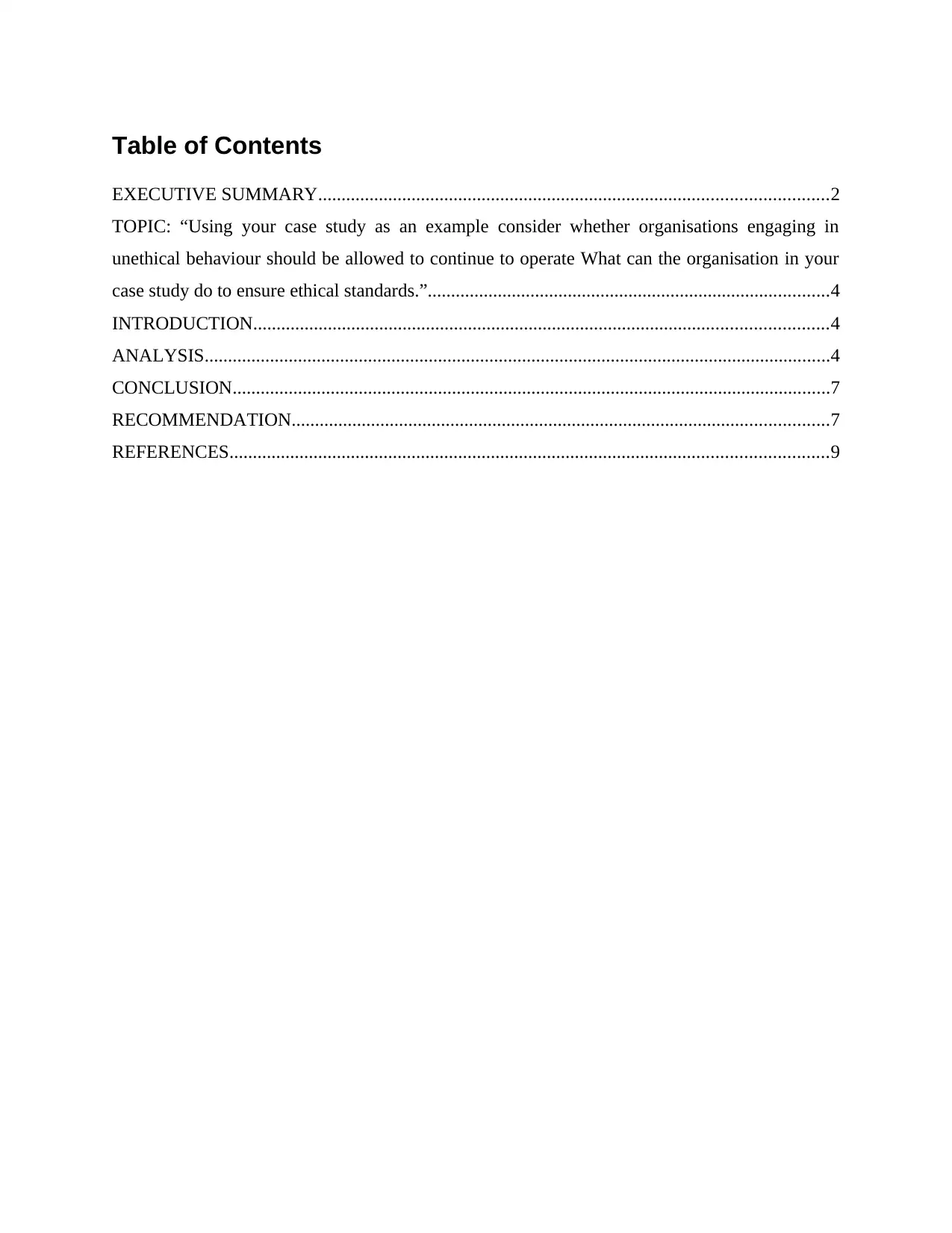
Table of Contents
EXECUTIVE SUMMARY.............................................................................................................2
TOPIC: “Using your case study as an example consider whether organisations engaging in
unethical behaviour should be allowed to continue to operate What can the organisation in your
case study do to ensure ethical standards.”......................................................................................4
INTRODUCTION...........................................................................................................................4
ANALYSIS......................................................................................................................................4
CONCLUSION................................................................................................................................7
RECOMMENDATION...................................................................................................................7
REFERENCES................................................................................................................................9
EXECUTIVE SUMMARY.............................................................................................................2
TOPIC: “Using your case study as an example consider whether organisations engaging in
unethical behaviour should be allowed to continue to operate What can the organisation in your
case study do to ensure ethical standards.”......................................................................................4
INTRODUCTION...........................................................................................................................4
ANALYSIS......................................................................................................................................4
CONCLUSION................................................................................................................................7
RECOMMENDATION...................................................................................................................7
REFERENCES................................................................................................................................9
⊘ This is a preview!⊘
Do you want full access?
Subscribe today to unlock all pages.

Trusted by 1+ million students worldwide
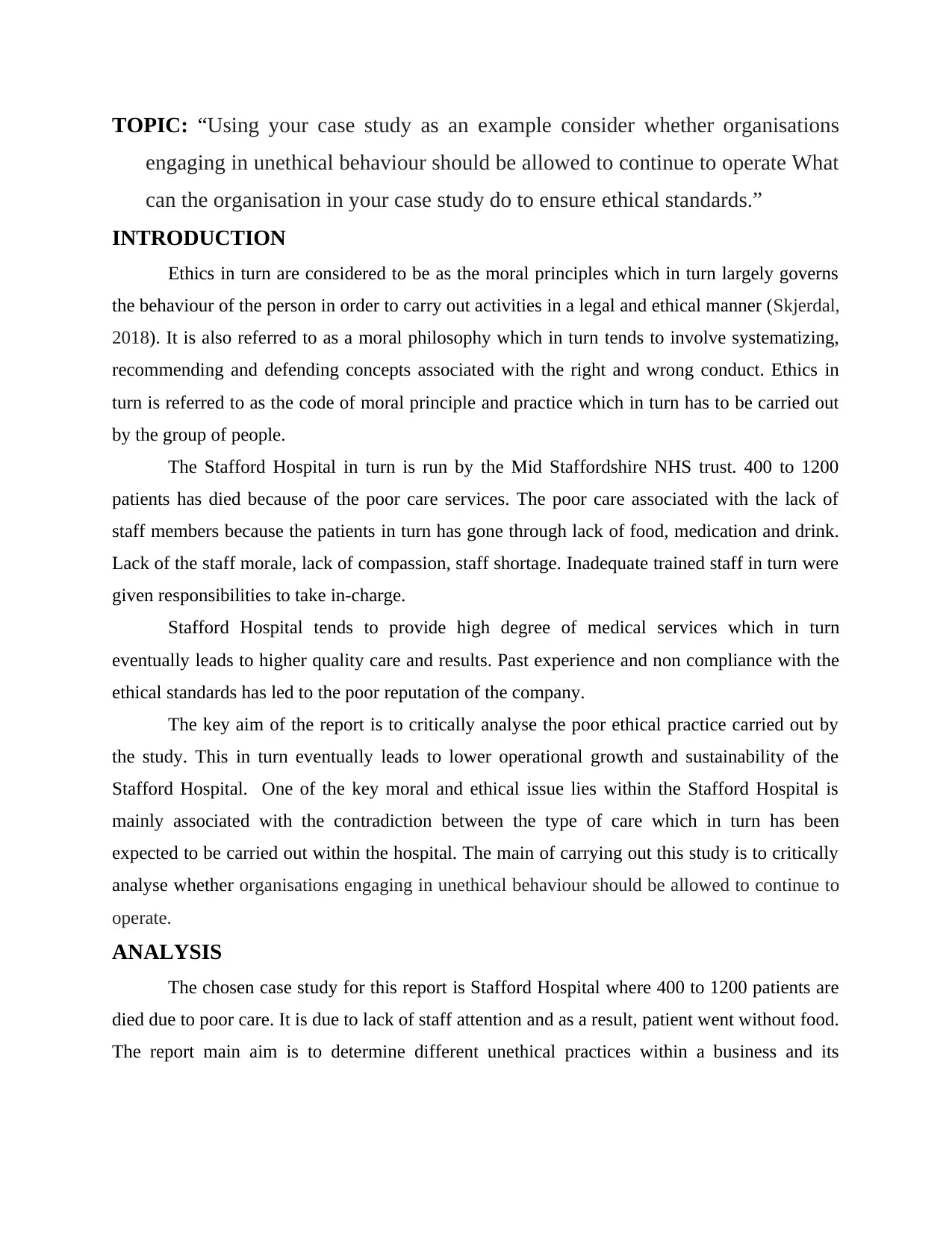
TOPIC: “Using your case study as an example consider whether organisations
engaging in unethical behaviour should be allowed to continue to operate What
can the organisation in your case study do to ensure ethical standards.”
INTRODUCTION
Ethics in turn are considered to be as the moral principles which in turn largely governs
the behaviour of the person in order to carry out activities in a legal and ethical manner (Skjerdal,
2018). It is also referred to as a moral philosophy which in turn tends to involve systematizing,
recommending and defending concepts associated with the right and wrong conduct. Ethics in
turn is referred to as the code of moral principle and practice which in turn has to be carried out
by the group of people.
The Stafford Hospital in turn is run by the Mid Staffordshire NHS trust. 400 to 1200
patients has died because of the poor care services. The poor care associated with the lack of
staff members because the patients in turn has gone through lack of food, medication and drink.
Lack of the staff morale, lack of compassion, staff shortage. Inadequate trained staff in turn were
given responsibilities to take in-charge.
Stafford Hospital tends to provide high degree of medical services which in turn
eventually leads to higher quality care and results. Past experience and non compliance with the
ethical standards has led to the poor reputation of the company.
The key aim of the report is to critically analyse the poor ethical practice carried out by
the study. This in turn eventually leads to lower operational growth and sustainability of the
Stafford Hospital. One of the key moral and ethical issue lies within the Stafford Hospital is
mainly associated with the contradiction between the type of care which in turn has been
expected to be carried out within the hospital. The main of carrying out this study is to critically
analyse whether organisations engaging in unethical behaviour should be allowed to continue to
operate.
ANALYSIS
The chosen case study for this report is Stafford Hospital where 400 to 1200 patients are
died due to poor care. It is due to lack of staff attention and as a result, patient went without food.
The report main aim is to determine different unethical practices within a business and its
engaging in unethical behaviour should be allowed to continue to operate What
can the organisation in your case study do to ensure ethical standards.”
INTRODUCTION
Ethics in turn are considered to be as the moral principles which in turn largely governs
the behaviour of the person in order to carry out activities in a legal and ethical manner (Skjerdal,
2018). It is also referred to as a moral philosophy which in turn tends to involve systematizing,
recommending and defending concepts associated with the right and wrong conduct. Ethics in
turn is referred to as the code of moral principle and practice which in turn has to be carried out
by the group of people.
The Stafford Hospital in turn is run by the Mid Staffordshire NHS trust. 400 to 1200
patients has died because of the poor care services. The poor care associated with the lack of
staff members because the patients in turn has gone through lack of food, medication and drink.
Lack of the staff morale, lack of compassion, staff shortage. Inadequate trained staff in turn were
given responsibilities to take in-charge.
Stafford Hospital tends to provide high degree of medical services which in turn
eventually leads to higher quality care and results. Past experience and non compliance with the
ethical standards has led to the poor reputation of the company.
The key aim of the report is to critically analyse the poor ethical practice carried out by
the study. This in turn eventually leads to lower operational growth and sustainability of the
Stafford Hospital. One of the key moral and ethical issue lies within the Stafford Hospital is
mainly associated with the contradiction between the type of care which in turn has been
expected to be carried out within the hospital. The main of carrying out this study is to critically
analyse whether organisations engaging in unethical behaviour should be allowed to continue to
operate.
ANALYSIS
The chosen case study for this report is Stafford Hospital where 400 to 1200 patients are
died due to poor care. It is due to lack of staff attention and as a result, patient went without food.
The report main aim is to determine different unethical practices within a business and its
Paraphrase This Document
Need a fresh take? Get an instant paraphrase of this document with our AI Paraphraser
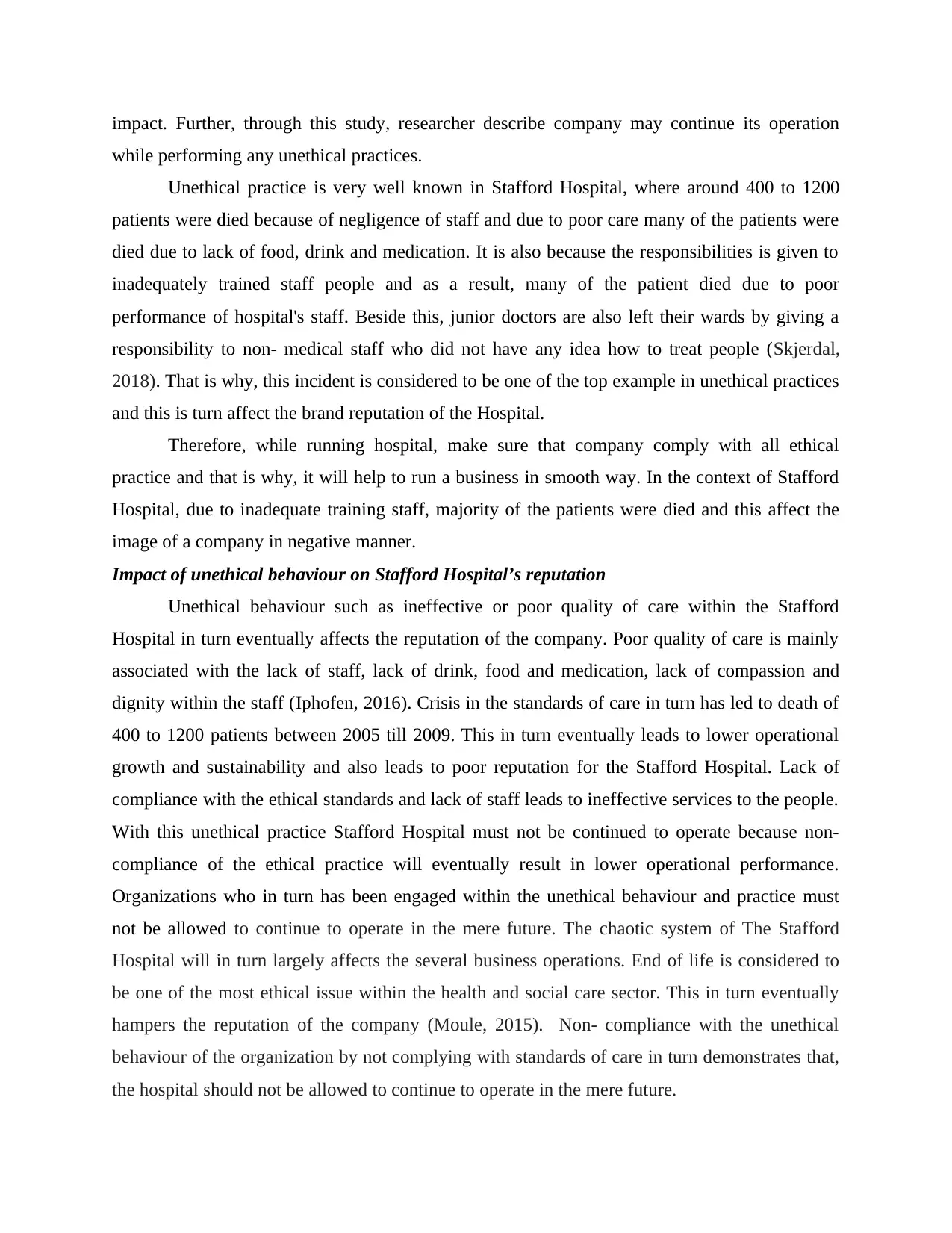
impact. Further, through this study, researcher describe company may continue its operation
while performing any unethical practices.
Unethical practice is very well known in Stafford Hospital, where around 400 to 1200
patients were died because of negligence of staff and due to poor care many of the patients were
died due to lack of food, drink and medication. It is also because the responsibilities is given to
inadequately trained staff people and as a result, many of the patient died due to poor
performance of hospital's staff. Beside this, junior doctors are also left their wards by giving a
responsibility to non- medical staff who did not have any idea how to treat people (Skjerdal,
2018). That is why, this incident is considered to be one of the top example in unethical practices
and this is turn affect the brand reputation of the Hospital.
Therefore, while running hospital, make sure that company comply with all ethical
practice and that is why, it will help to run a business in smooth way. In the context of Stafford
Hospital, due to inadequate training staff, majority of the patients were died and this affect the
image of a company in negative manner.
Impact of unethical behaviour on Stafford Hospital’s reputation
Unethical behaviour such as ineffective or poor quality of care within the Stafford
Hospital in turn eventually affects the reputation of the company. Poor quality of care is mainly
associated with the lack of staff, lack of drink, food and medication, lack of compassion and
dignity within the staff (Iphofen, 2016). Crisis in the standards of care in turn has led to death of
400 to 1200 patients between 2005 till 2009. This in turn eventually leads to lower operational
growth and sustainability and also leads to poor reputation for the Stafford Hospital. Lack of
compliance with the ethical standards and lack of staff leads to ineffective services to the people.
With this unethical practice Stafford Hospital must not be continued to operate because non-
compliance of the ethical practice will eventually result in lower operational performance.
Organizations who in turn has been engaged within the unethical behaviour and practice must
not be allowed to continue to operate in the mere future. The chaotic system of The Stafford
Hospital will in turn largely affects the several business operations. End of life is considered to
be one of the most ethical issue within the health and social care sector. This in turn eventually
hampers the reputation of the company (Moule, 2015). Non- compliance with the unethical
behaviour of the organization by not complying with standards of care in turn demonstrates that,
the hospital should not be allowed to continue to operate in the mere future.
while performing any unethical practices.
Unethical practice is very well known in Stafford Hospital, where around 400 to 1200
patients were died because of negligence of staff and due to poor care many of the patients were
died due to lack of food, drink and medication. It is also because the responsibilities is given to
inadequately trained staff people and as a result, many of the patient died due to poor
performance of hospital's staff. Beside this, junior doctors are also left their wards by giving a
responsibility to non- medical staff who did not have any idea how to treat people (Skjerdal,
2018). That is why, this incident is considered to be one of the top example in unethical practices
and this is turn affect the brand reputation of the Hospital.
Therefore, while running hospital, make sure that company comply with all ethical
practice and that is why, it will help to run a business in smooth way. In the context of Stafford
Hospital, due to inadequate training staff, majority of the patients were died and this affect the
image of a company in negative manner.
Impact of unethical behaviour on Stafford Hospital’s reputation
Unethical behaviour such as ineffective or poor quality of care within the Stafford
Hospital in turn eventually affects the reputation of the company. Poor quality of care is mainly
associated with the lack of staff, lack of drink, food and medication, lack of compassion and
dignity within the staff (Iphofen, 2016). Crisis in the standards of care in turn has led to death of
400 to 1200 patients between 2005 till 2009. This in turn eventually leads to lower operational
growth and sustainability and also leads to poor reputation for the Stafford Hospital. Lack of
compliance with the ethical standards and lack of staff leads to ineffective services to the people.
With this unethical practice Stafford Hospital must not be continued to operate because non-
compliance of the ethical practice will eventually result in lower operational performance.
Organizations who in turn has been engaged within the unethical behaviour and practice must
not be allowed to continue to operate in the mere future. The chaotic system of The Stafford
Hospital will in turn largely affects the several business operations. End of life is considered to
be one of the most ethical issue within the health and social care sector. This in turn eventually
hampers the reputation of the company (Moule, 2015). Non- compliance with the unethical
behaviour of the organization by not complying with standards of care in turn demonstrates that,
the hospital should not be allowed to continue to operate in the mere future.
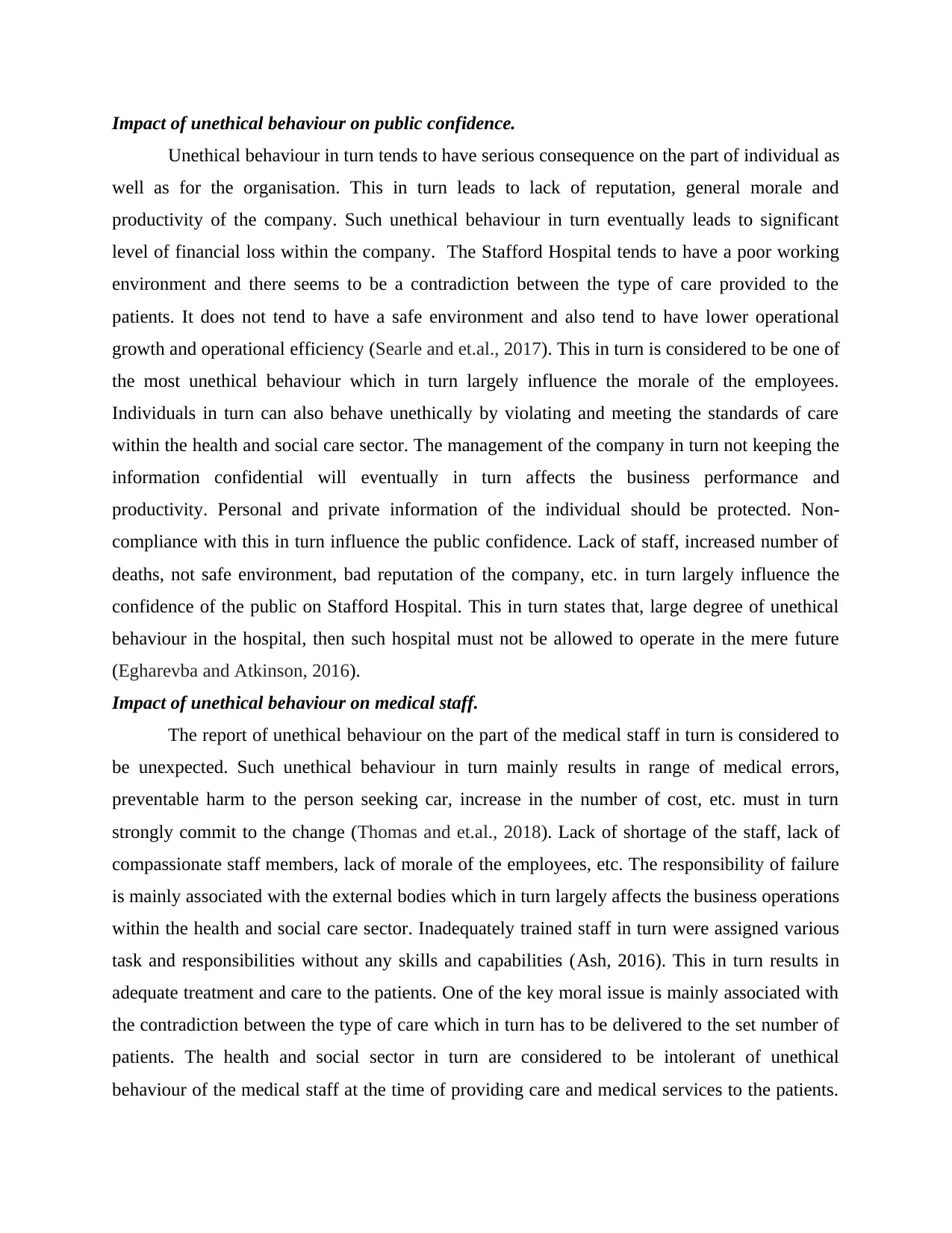
Impact of unethical behaviour on public confidence.
Unethical behaviour in turn tends to have serious consequence on the part of individual as
well as for the organisation. This in turn leads to lack of reputation, general morale and
productivity of the company. Such unethical behaviour in turn eventually leads to significant
level of financial loss within the company. The Stafford Hospital tends to have a poor working
environment and there seems to be a contradiction between the type of care provided to the
patients. It does not tend to have a safe environment and also tend to have lower operational
growth and operational efficiency (Searle and et.al., 2017). This in turn is considered to be one of
the most unethical behaviour which in turn largely influence the morale of the employees.
Individuals in turn can also behave unethically by violating and meeting the standards of care
within the health and social care sector. The management of the company in turn not keeping the
information confidential will eventually in turn affects the business performance and
productivity. Personal and private information of the individual should be protected. Non-
compliance with this in turn influence the public confidence. Lack of staff, increased number of
deaths, not safe environment, bad reputation of the company, etc. in turn largely influence the
confidence of the public on Stafford Hospital. This in turn states that, large degree of unethical
behaviour in the hospital, then such hospital must not be allowed to operate in the mere future
(Egharevba and Atkinson, 2016).
Impact of unethical behaviour on medical staff.
The report of unethical behaviour on the part of the medical staff in turn is considered to
be unexpected. Such unethical behaviour in turn mainly results in range of medical errors,
preventable harm to the person seeking car, increase in the number of cost, etc. must in turn
strongly commit to the change (Thomas and et.al., 2018). Lack of shortage of the staff, lack of
compassionate staff members, lack of morale of the employees, etc. The responsibility of failure
is mainly associated with the external bodies which in turn largely affects the business operations
within the health and social care sector. Inadequately trained staff in turn were assigned various
task and responsibilities without any skills and capabilities (Ash, 2016). This in turn results in
adequate treatment and care to the patients. One of the key moral issue is mainly associated with
the contradiction between the type of care which in turn has to be delivered to the set number of
patients. The health and social sector in turn are considered to be intolerant of unethical
behaviour of the medical staff at the time of providing care and medical services to the patients.
Unethical behaviour in turn tends to have serious consequence on the part of individual as
well as for the organisation. This in turn leads to lack of reputation, general morale and
productivity of the company. Such unethical behaviour in turn eventually leads to significant
level of financial loss within the company. The Stafford Hospital tends to have a poor working
environment and there seems to be a contradiction between the type of care provided to the
patients. It does not tend to have a safe environment and also tend to have lower operational
growth and operational efficiency (Searle and et.al., 2017). This in turn is considered to be one of
the most unethical behaviour which in turn largely influence the morale of the employees.
Individuals in turn can also behave unethically by violating and meeting the standards of care
within the health and social care sector. The management of the company in turn not keeping the
information confidential will eventually in turn affects the business performance and
productivity. Personal and private information of the individual should be protected. Non-
compliance with this in turn influence the public confidence. Lack of staff, increased number of
deaths, not safe environment, bad reputation of the company, etc. in turn largely influence the
confidence of the public on Stafford Hospital. This in turn states that, large degree of unethical
behaviour in the hospital, then such hospital must not be allowed to operate in the mere future
(Egharevba and Atkinson, 2016).
Impact of unethical behaviour on medical staff.
The report of unethical behaviour on the part of the medical staff in turn is considered to
be unexpected. Such unethical behaviour in turn mainly results in range of medical errors,
preventable harm to the person seeking car, increase in the number of cost, etc. must in turn
strongly commit to the change (Thomas and et.al., 2018). Lack of shortage of the staff, lack of
compassionate staff members, lack of morale of the employees, etc. The responsibility of failure
is mainly associated with the external bodies which in turn largely affects the business operations
within the health and social care sector. Inadequately trained staff in turn were assigned various
task and responsibilities without any skills and capabilities (Ash, 2016). This in turn results in
adequate treatment and care to the patients. One of the key moral issue is mainly associated with
the contradiction between the type of care which in turn has to be delivered to the set number of
patients. The health and social sector in turn are considered to be intolerant of unethical
behaviour of the medical staff at the time of providing care and medical services to the patients.
⊘ This is a preview!⊘
Do you want full access?
Subscribe today to unlock all pages.

Trusted by 1+ million students worldwide
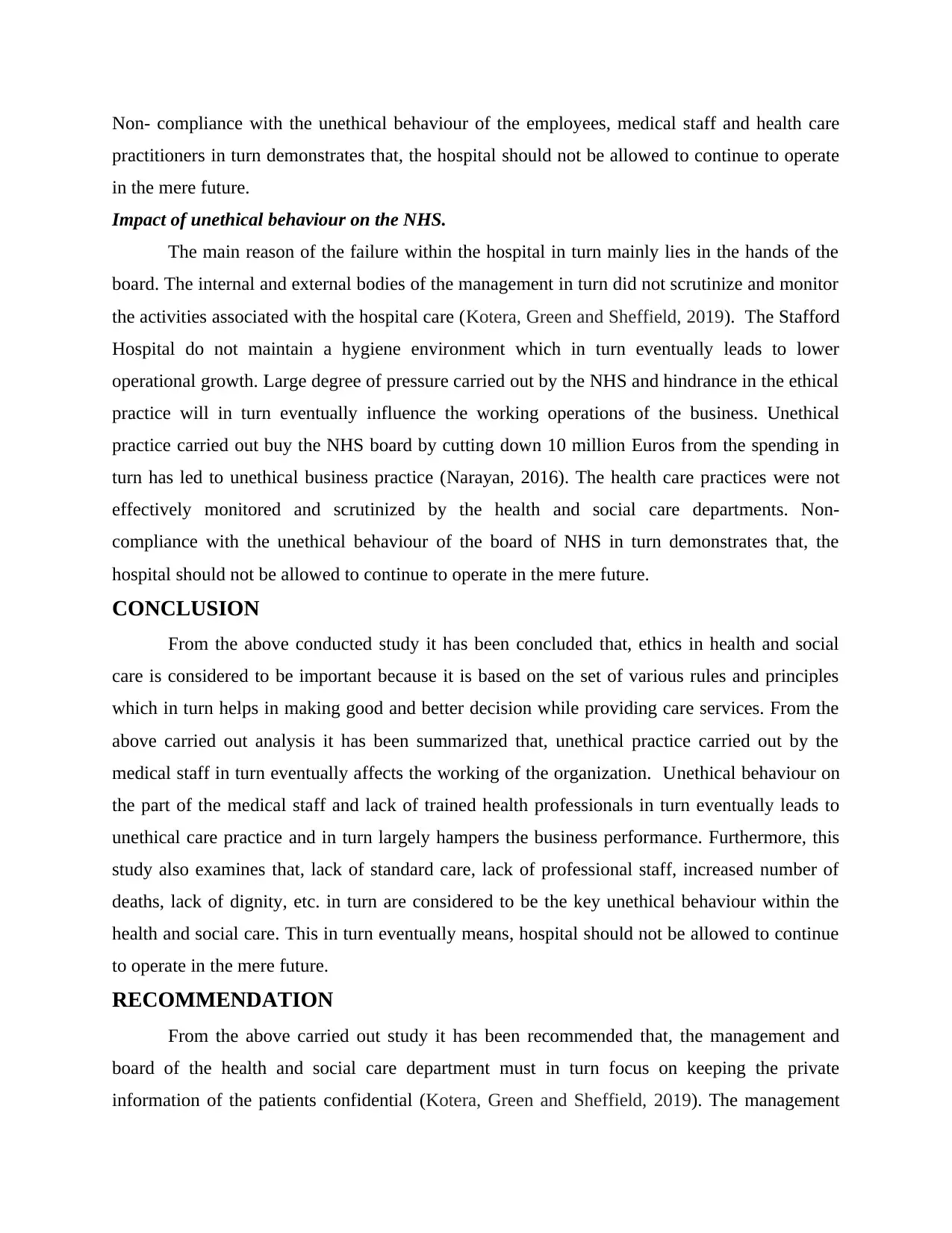
Non- compliance with the unethical behaviour of the employees, medical staff and health care
practitioners in turn demonstrates that, the hospital should not be allowed to continue to operate
in the mere future.
Impact of unethical behaviour on the NHS.
The main reason of the failure within the hospital in turn mainly lies in the hands of the
board. The internal and external bodies of the management in turn did not scrutinize and monitor
the activities associated with the hospital care (Kotera, Green and Sheffield, 2019). The Stafford
Hospital do not maintain a hygiene environment which in turn eventually leads to lower
operational growth. Large degree of pressure carried out by the NHS and hindrance in the ethical
practice will in turn eventually influence the working operations of the business. Unethical
practice carried out buy the NHS board by cutting down 10 million Euros from the spending in
turn has led to unethical business practice (Narayan, 2016). The health care practices were not
effectively monitored and scrutinized by the health and social care departments. Non-
compliance with the unethical behaviour of the board of NHS in turn demonstrates that, the
hospital should not be allowed to continue to operate in the mere future.
CONCLUSION
From the above conducted study it has been concluded that, ethics in health and social
care is considered to be important because it is based on the set of various rules and principles
which in turn helps in making good and better decision while providing care services. From the
above carried out analysis it has been summarized that, unethical practice carried out by the
medical staff in turn eventually affects the working of the organization. Unethical behaviour on
the part of the medical staff and lack of trained health professionals in turn eventually leads to
unethical care practice and in turn largely hampers the business performance. Furthermore, this
study also examines that, lack of standard care, lack of professional staff, increased number of
deaths, lack of dignity, etc. in turn are considered to be the key unethical behaviour within the
health and social care. This in turn eventually means, hospital should not be allowed to continue
to operate in the mere future.
RECOMMENDATION
From the above carried out study it has been recommended that, the management and
board of the health and social care department must in turn focus on keeping the private
information of the patients confidential (Kotera, Green and Sheffield, 2019). The management
practitioners in turn demonstrates that, the hospital should not be allowed to continue to operate
in the mere future.
Impact of unethical behaviour on the NHS.
The main reason of the failure within the hospital in turn mainly lies in the hands of the
board. The internal and external bodies of the management in turn did not scrutinize and monitor
the activities associated with the hospital care (Kotera, Green and Sheffield, 2019). The Stafford
Hospital do not maintain a hygiene environment which in turn eventually leads to lower
operational growth. Large degree of pressure carried out by the NHS and hindrance in the ethical
practice will in turn eventually influence the working operations of the business. Unethical
practice carried out buy the NHS board by cutting down 10 million Euros from the spending in
turn has led to unethical business practice (Narayan, 2016). The health care practices were not
effectively monitored and scrutinized by the health and social care departments. Non-
compliance with the unethical behaviour of the board of NHS in turn demonstrates that, the
hospital should not be allowed to continue to operate in the mere future.
CONCLUSION
From the above conducted study it has been concluded that, ethics in health and social
care is considered to be important because it is based on the set of various rules and principles
which in turn helps in making good and better decision while providing care services. From the
above carried out analysis it has been summarized that, unethical practice carried out by the
medical staff in turn eventually affects the working of the organization. Unethical behaviour on
the part of the medical staff and lack of trained health professionals in turn eventually leads to
unethical care practice and in turn largely hampers the business performance. Furthermore, this
study also examines that, lack of standard care, lack of professional staff, increased number of
deaths, lack of dignity, etc. in turn are considered to be the key unethical behaviour within the
health and social care. This in turn eventually means, hospital should not be allowed to continue
to operate in the mere future.
RECOMMENDATION
From the above carried out study it has been recommended that, the management and
board of the health and social care department must in turn focus on keeping the private
information of the patients confidential (Kotera, Green and Sheffield, 2019). The management
Paraphrase This Document
Need a fresh take? Get an instant paraphrase of this document with our AI Paraphraser
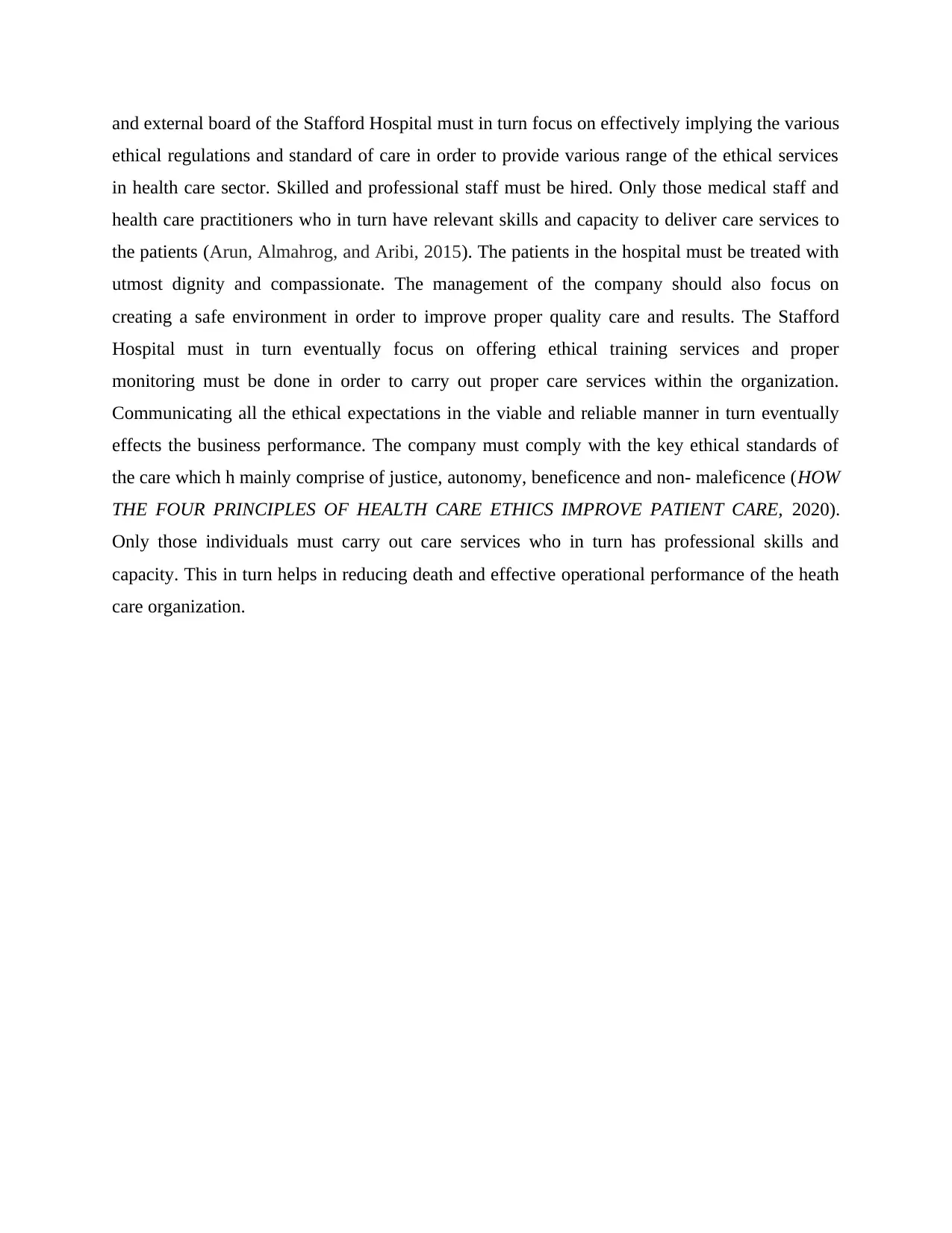
and external board of the Stafford Hospital must in turn focus on effectively implying the various
ethical regulations and standard of care in order to provide various range of the ethical services
in health care sector. Skilled and professional staff must be hired. Only those medical staff and
health care practitioners who in turn have relevant skills and capacity to deliver care services to
the patients (Arun, Almahrog, and Aribi, 2015). The patients in the hospital must be treated with
utmost dignity and compassionate. The management of the company should also focus on
creating a safe environment in order to improve proper quality care and results. The Stafford
Hospital must in turn eventually focus on offering ethical training services and proper
monitoring must be done in order to carry out proper care services within the organization.
Communicating all the ethical expectations in the viable and reliable manner in turn eventually
effects the business performance. The company must comply with the key ethical standards of
the care which h mainly comprise of justice, autonomy, beneficence and non- maleficence (HOW
THE FOUR PRINCIPLES OF HEALTH CARE ETHICS IMPROVE PATIENT CARE, 2020).
Only those individuals must carry out care services who in turn has professional skills and
capacity. This in turn helps in reducing death and effective operational performance of the heath
care organization.
ethical regulations and standard of care in order to provide various range of the ethical services
in health care sector. Skilled and professional staff must be hired. Only those medical staff and
health care practitioners who in turn have relevant skills and capacity to deliver care services to
the patients (Arun, Almahrog, and Aribi, 2015). The patients in the hospital must be treated with
utmost dignity and compassionate. The management of the company should also focus on
creating a safe environment in order to improve proper quality care and results. The Stafford
Hospital must in turn eventually focus on offering ethical training services and proper
monitoring must be done in order to carry out proper care services within the organization.
Communicating all the ethical expectations in the viable and reliable manner in turn eventually
effects the business performance. The company must comply with the key ethical standards of
the care which h mainly comprise of justice, autonomy, beneficence and non- maleficence (HOW
THE FOUR PRINCIPLES OF HEALTH CARE ETHICS IMPROVE PATIENT CARE, 2020).
Only those individuals must carry out care services who in turn has professional skills and
capacity. This in turn helps in reducing death and effective operational performance of the heath
care organization.
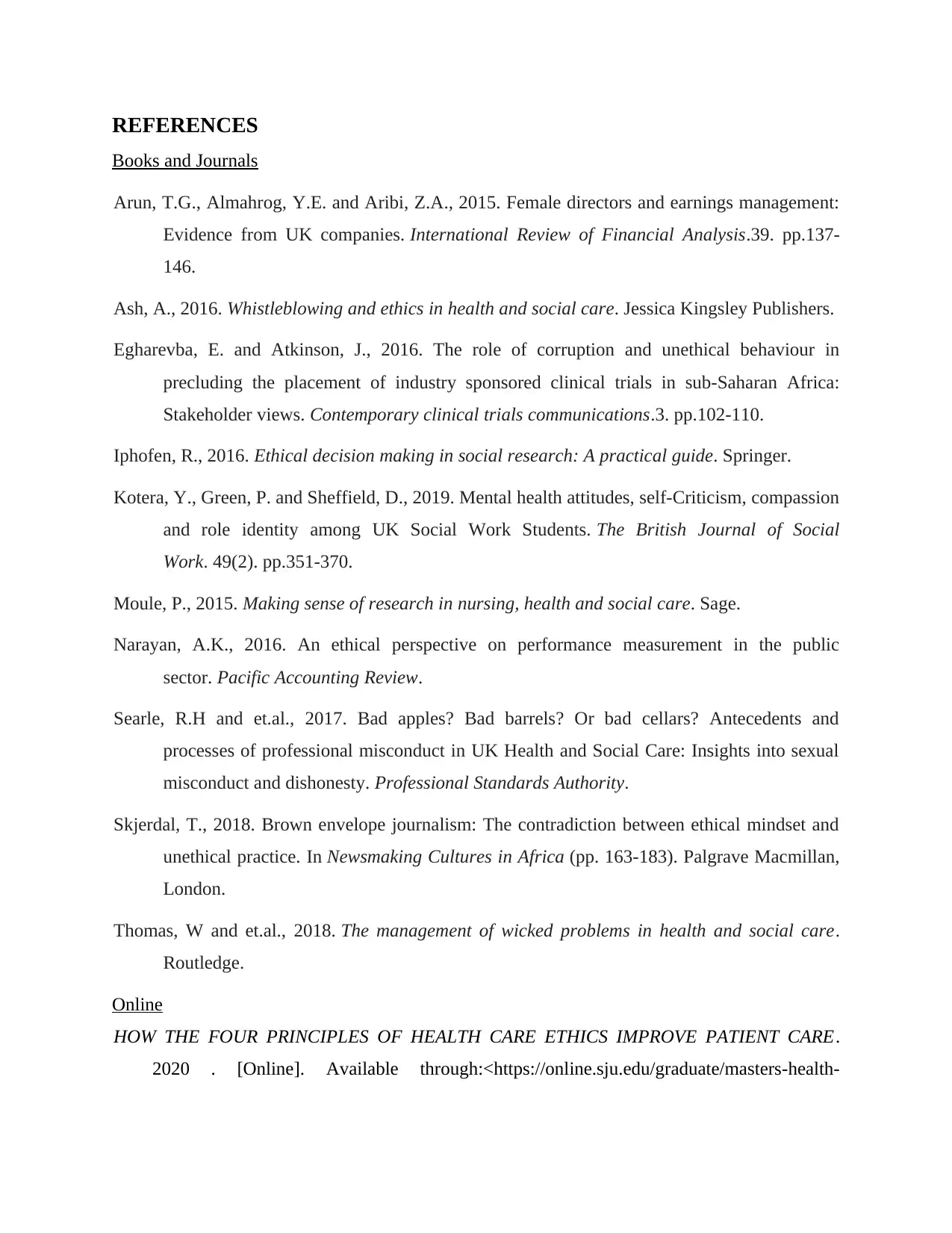
REFERENCES
Books and Journals
Arun, T.G., Almahrog, Y.E. and Aribi, Z.A., 2015. Female directors and earnings management:
Evidence from UK companies. International Review of Financial Analysis.39. pp.137-
146.
Ash, A., 2016. Whistleblowing and ethics in health and social care. Jessica Kingsley Publishers.
Egharevba, E. and Atkinson, J., 2016. The role of corruption and unethical behaviour in
precluding the placement of industry sponsored clinical trials in sub-Saharan Africa:
Stakeholder views. Contemporary clinical trials communications.3. pp.102-110.
Iphofen, R., 2016. Ethical decision making in social research: A practical guide. Springer.
Kotera, Y., Green, P. and Sheffield, D., 2019. Mental health attitudes, self-Criticism, compassion
and role identity among UK Social Work Students. The British Journal of Social
Work. 49(2). pp.351-370.
Moule, P., 2015. Making sense of research in nursing, health and social care. Sage.
Narayan, A.K., 2016. An ethical perspective on performance measurement in the public
sector. Pacific Accounting Review.
Searle, R.H and et.al., 2017. Bad apples? Bad barrels? Or bad cellars? Antecedents and
processes of professional misconduct in UK Health and Social Care: Insights into sexual
misconduct and dishonesty. Professional Standards Authority.
Skjerdal, T., 2018. Brown envelope journalism: The contradiction between ethical mindset and
unethical practice. In Newsmaking Cultures in Africa (pp. 163-183). Palgrave Macmillan,
London.
Thomas, W and et.al., 2018. The management of wicked problems in health and social care.
Routledge.
Online
HOW THE FOUR PRINCIPLES OF HEALTH CARE ETHICS IMPROVE PATIENT CARE.
2020 . [Online]. Available through:<https://online.sju.edu/graduate/masters-health-
Books and Journals
Arun, T.G., Almahrog, Y.E. and Aribi, Z.A., 2015. Female directors and earnings management:
Evidence from UK companies. International Review of Financial Analysis.39. pp.137-
146.
Ash, A., 2016. Whistleblowing and ethics in health and social care. Jessica Kingsley Publishers.
Egharevba, E. and Atkinson, J., 2016. The role of corruption and unethical behaviour in
precluding the placement of industry sponsored clinical trials in sub-Saharan Africa:
Stakeholder views. Contemporary clinical trials communications.3. pp.102-110.
Iphofen, R., 2016. Ethical decision making in social research: A practical guide. Springer.
Kotera, Y., Green, P. and Sheffield, D., 2019. Mental health attitudes, self-Criticism, compassion
and role identity among UK Social Work Students. The British Journal of Social
Work. 49(2). pp.351-370.
Moule, P., 2015. Making sense of research in nursing, health and social care. Sage.
Narayan, A.K., 2016. An ethical perspective on performance measurement in the public
sector. Pacific Accounting Review.
Searle, R.H and et.al., 2017. Bad apples? Bad barrels? Or bad cellars? Antecedents and
processes of professional misconduct in UK Health and Social Care: Insights into sexual
misconduct and dishonesty. Professional Standards Authority.
Skjerdal, T., 2018. Brown envelope journalism: The contradiction between ethical mindset and
unethical practice. In Newsmaking Cultures in Africa (pp. 163-183). Palgrave Macmillan,
London.
Thomas, W and et.al., 2018. The management of wicked problems in health and social care.
Routledge.
Online
HOW THE FOUR PRINCIPLES OF HEALTH CARE ETHICS IMPROVE PATIENT CARE.
2020 . [Online]. Available through:<https://online.sju.edu/graduate/masters-health-
⊘ This is a preview!⊘
Do you want full access?
Subscribe today to unlock all pages.

Trusted by 1+ million students worldwide
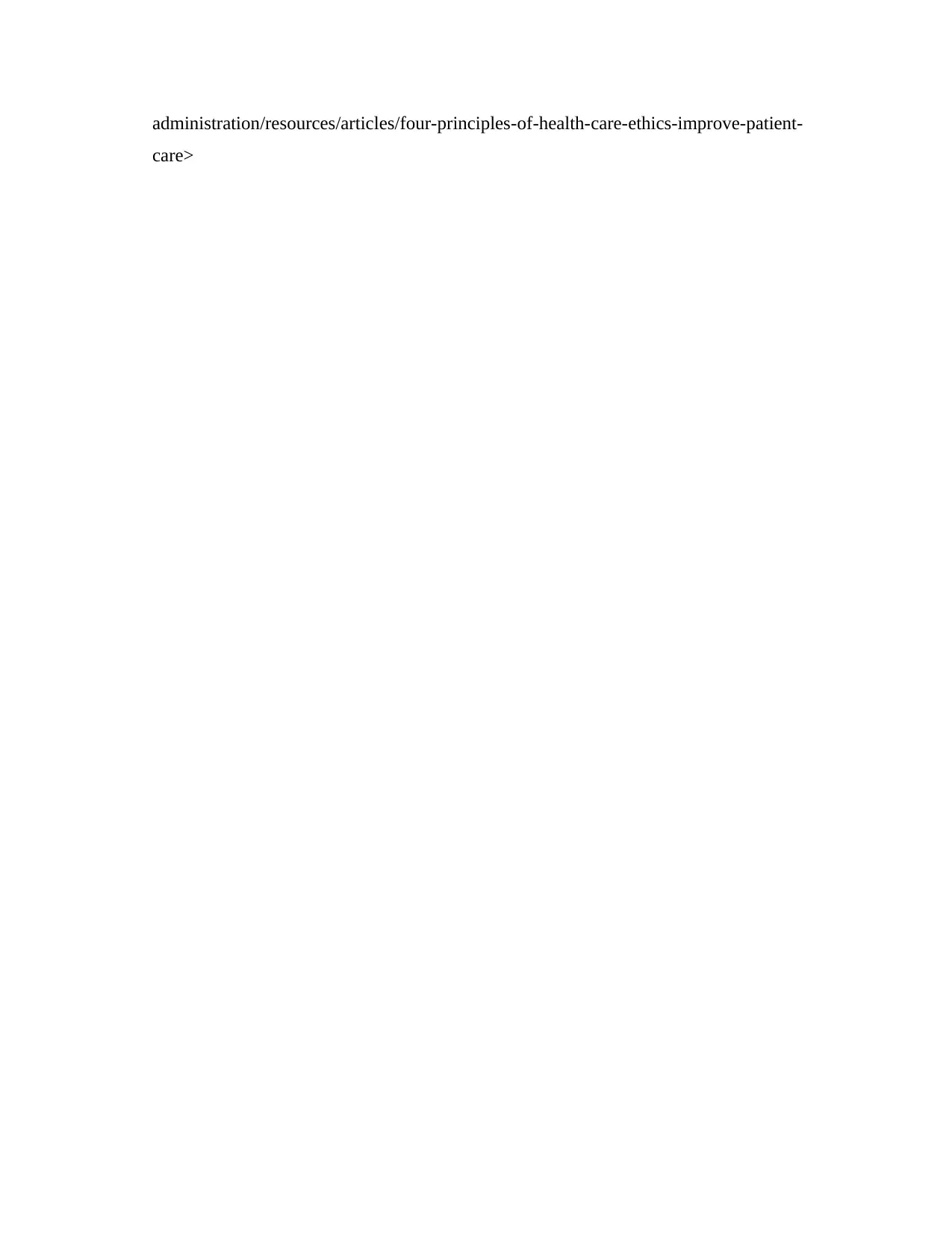
administration/resources/articles/four-principles-of-health-care-ethics-improve-patient-
care>
care>
1 out of 10
Related Documents
Your All-in-One AI-Powered Toolkit for Academic Success.
+13062052269
info@desklib.com
Available 24*7 on WhatsApp / Email
![[object Object]](/_next/static/media/star-bottom.7253800d.svg)
Unlock your academic potential
Copyright © 2020–2026 A2Z Services. All Rights Reserved. Developed and managed by ZUCOL.





